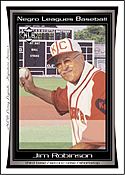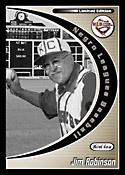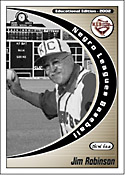Meet the Players :: Jim Robinson
|
<< Previous player
Next player >>
|
|
 |
 |
 |
Name: James (Jim) Robinson
DOB: January 21, 1930
Birthplace: New York, NY
|
 |
Philadelphia Stars End of 1952
Indianapolis Clowns 1953
Kansas City Monarchs 1956-1958
|
| Position: third base, second base and shortstop
Bats: right
Throws: right
|
Jim Robinson was born to Alma and James Robinson on January 21, 1930 in New York, New York. His mother, Alma, was a very gentile and loving woman. She wholeheartedly supported her children's endeavors and encouraged them to fulfill their dreams. His dad was a happy, friendly man that worked in the hotel industry. He was well liked in the neighborhood and the life of every party. Young Jim grew up in the city playing sports alongside his close friends Eugene Walker, Fred Wilson, and Lionel Evelyn. He would eventually have two younger brothers, Thomas and Alfred. They grew very close as they matured.
Jim began his baseball career on the sandlot fields of Morningside Park, right in the heart of New York City. This park, nicknamed "The Dustbowl" had so little grass, that any activity on the field would create a huge dust cloud. The diamond was small and the fences short but the neighborhood residents would still come out to watch the boys play and cheer them on. Baseball seemed to be the most important thing in Jim's life. In the summer, his team would join the others in Central Park for days of competitive fun.
By the time Jim entered Commerce High School, he had his mind set on a future that would include baseball. His favorite teacher and high school coach was Mr. Bill Flynn. Coach Flynn was a great source of help, always available to his students and players. Alma (Jim's mom) would turn out to be a major force in helping Jim make the decision to continue his secondary studies of physical education and pursue a baseball career at North Carolina A&T State University in Greensboro NC. The varsity baseball coaches for the college team was Mr. Joe Echols and Mr. Felix Harris. Coach Echols was patient but extremely demanding with his players. His personal baseball resume included experience with the Newark Eagles of the Negro Leagues alongside teammates Monte Irvin and Larry Doby. Coach Echols helped Jim develop the confidence that a player entering advanced levels of play must possess.
As Jim's college baseball season came to a close in 1952, he was to play for Manager Oscar Charleston of the Philadelphia Stars Organization of the Negro Leagues. It would turn out however, that Jim's arm, broken back in the middle of the season, was not quite healed. Jim was in shape to join the team' infield and close out the season's last 7 or 8 games. In 1953, Jim played 3rd base for the Indianapolis Clowns in a post season "barnstorming tour" of approximately 30 games. His play was outstanding and at the outcome, Quincy Troupe signed him to a minor league contract with the St. Louis Cardinal Organization.
In December of 1953, Jim was drafted by the United States Army and was on his way to serve in Fort Bliss, Texas and would later be transferred to serve a tour in Korea. While stationed in Korea, Jim played 2nd base for a strong Post Team that saw their All Army Championship opportunity slip away after losing the division championship game.
Jim returned from military service in October of 1955 and in the spring of 1956 he returned to the fields of the Negro Leagues, playing 2nd base and shortstop for the Kansas City Monarchs. His performance throughout the season earned him a spot on the West All-Star Team at the annual East-West All-Star Game played at Comiskey Park in Chicago, Illinois. Jim returned to play for the Monarchs in 1957 and 1958 and was named a team captain. He was again selected to represent the West All-Stars in both the `57 and `58 East-West All-Star Games also played at Comiskey Park. He was cited for the "Most Outstanding Defensive Play" while playing shortstop for the West in the 1958 game.
Jim recalls, "during the 1950's the south was still segregated. We (specifically the K.C. Monarchs but not excluding the general black population) did not have access to most eating places and hotels, and as a result, spent a lot of time on the team bus."
|
|
| |
<< Previous player
Next player >>
|
|
Copyright 2025 JJB & Company, Inc., Baseball in Living Color All Rights Reserved.
No part of this website (photos, graphics, text, etc.) may be reproduced, stored in a retrievable system by any means, including mechanical, electronic, recording, or otherwise, without written permission.

|

